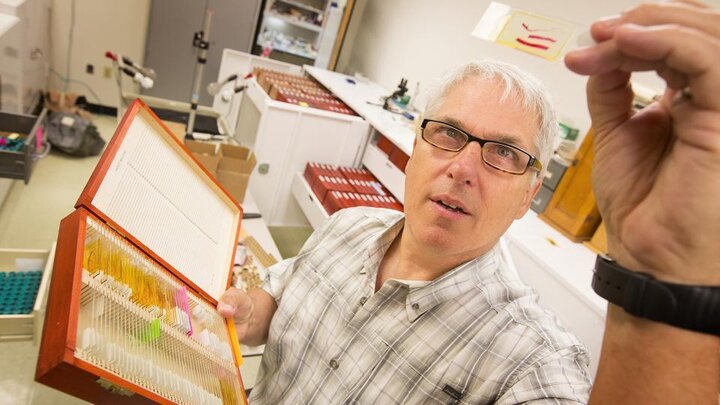Above: Scott Gardner garnered headlines in 2014 when he led a team that discovered four new species of tuco-tucos while studying parasites in Bolivia. Tuco-tucos are a South American rodent, about 24 inches long that live in Bolivia.
College of Arts and Sciences faculty, students and programs were featured or cited in national media outlets numerous times in 2014. Here are some highlights:
UNL scientists announced the discovery or identification of three previously unrecognized species during the year. Director Frank Rack and a team from the Antarctic Geological Drilling (ANDRILL) program based at UNL received worldwide news coverage in January for finding thousands of sea anemones buried in ice on the underside of the Ross Ice Shelf in Antarctica. In May, Time magazine named Edwardsiella andrillae, the first sea anemone found to live in ice, as one of its top 10 species for 2014.
Scott Gardner, director of the Harold W. Manter Laboratory of Parasitology, appeared in National Geographic and on NBC News,among other national outlets, for his discovery of four previously unidentified species of tuco-tucos, a gopher-like species that lives in South America. Gardner also was part of an international team of scientists that identified a 240 million-year-old pinworm egg, believed to have infected cynodonts, the ancestors of modern mammals.
Leading-edge research into the biology of political differences had political scientists John Hibbing and Kevin Smith making scores of headlines throughout the year. The Washington Monthly covered their 2014 book "Predisposed: Liberals, Conservatives and the Biology of Political Differences." Newly published studies, including one linking the stress hormone cortisol with voting behavior and another using functional Magnetic Resonance Imaging, also generated news items. When the pair weren't talking about their research, they shared election-year insights about Nebraska politics with national reporters. Smith, for example, authored "Little House on the Prairie," a Politico piece on Nebraska's one-house legislature.
Multiple UNL-led research efforts into the causes and consequences of obesity also received extensive coverage. In February, USA Today, Reuters and CNN covered a study by Tim Nelson, psychology, and graduate student Alyssa Lundahl that showed many parents don't recognize when their child is overweight.
Timothy Gay and Joan Dreiling, physics, were covered by Scientific American and other major publications after they solved the long unanswered puzzle of the asymmetry of life -- why biochemical molecules are "left-handed" or "right-handed."
Timothy Gay, physics, was quoted on NBC News and ABC News, when he testified before Congress in March about brain injuries in sports. Dennis Molfese, director of the Center for Brain, Biology and Behavior also testified at the hearing.
Robert Shepard, Center for Great Plains, got headlines in Time magazine and elsewhere for his study examining how depopulation affects the ratio of young men to young women in rural communities in Nebraska and Kansas.
Mitchel Herian, political science, made the news with his study that found states where liberal politics dominate tend to have better health than those where conservatives preponderate.
Religion News Service, Inside Higher education, and The Atlantic.com were among publications that picked up on research into the changing demographics of religion by Philip Schwadel, sociology. Among other things, Schwadel found that college graduates are not more likely to turn away from religion.
Efforts to improve diversity in UNL's computer science department captured national attention after UNL joined a nationwide initiative led by the Anita Borg Institute and Harvey Mudd College. In December, the Washington Post published an article that looked at UNL's efforts to encourage more women to enter fields such as math, computer science and statistics. The story quoted statistics professors Erin Blankenshipand Walter Stroup; students Marina Ptukhina, Aimee Schwaband Dola Pathak, along with computer science department chairMatthew Dwyer and math department chair Judy Walker.
Timothy Gay, physics, was interviewed by the LA Times and the Wall Street Journal about how physics might affect the outcome of the 2014 Super Bowl.
Film studies professor Wheeler Winston Dixon commented on many events as they unfolded in the entertainment industry, from the 2014 Oscars, to the deaths of Shirley Temple and Mike Nichols, and the enduring impact of films Pulp Fiction and Ghostbusters as they marked milestone anniversaries. Los Angeles Times stories that were syndicated worldwide quoted him on a computer hack of Sony Pictures in apparent retaliation for "The Interview," a movie about a fictional assassination plot against North Korean dictator Kim Jong Un.




